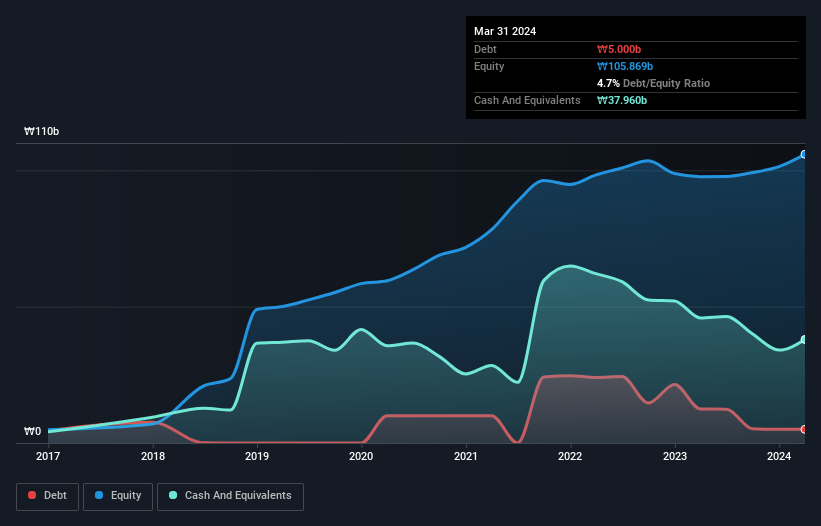- South Korea
- /
- Personal Products
- /
- KOSDAQ:A270870
We Think Newtree (KOSDAQ:270870) Can Stay On Top Of Its Debt
Some say volatility, rather than debt, is the best way to think about risk as an investor, but Warren Buffett famously said that 'Volatility is far from synonymous with risk.' It's only natural to consider a company's balance sheet when you examine how risky it is, since debt is often involved when a business collapses. Importantly, Newtree Co., Ltd. (KOSDAQ:270870) does carry debt. But the real question is whether this debt is making the company risky.
Why Does Debt Bring Risk?
Generally speaking, debt only becomes a real problem when a company can't easily pay it off, either by raising capital or with its own cash flow. Ultimately, if the company can't fulfill its legal obligations to repay debt, shareholders could walk away with nothing. However, a more usual (but still expensive) situation is where a company must dilute shareholders at a cheap share price simply to get debt under control. By replacing dilution, though, debt can be an extremely good tool for businesses that need capital to invest in growth at high rates of return. When we think about a company's use of debt, we first look at cash and debt together.
Check out our latest analysis for Newtree
What Is Newtree's Debt?
As you can see below, Newtree had ₩5.00b of debt at March 2024, down from ₩12.5b a year prior. But on the other hand it also has ₩38.0b in cash, leading to a ₩33.0b net cash position.

How Strong Is Newtree's Balance Sheet?
Zooming in on the latest balance sheet data, we can see that Newtree had liabilities of ₩12.6b due within 12 months and liabilities of ₩20.7b due beyond that. On the other hand, it had cash of ₩38.0b and ₩6.76b worth of receivables due within a year. So it actually has ₩11.4b more liquid assets than total liabilities.
This surplus suggests that Newtree is using debt in a way that is appears to be both safe and conservative. Given it has easily adequate short term liquidity, we don't think it will have any issues with its lenders. Succinctly put, Newtree boasts net cash, so it's fair to say it does not have a heavy debt load!
It was also good to see that despite losing money on the EBIT line last year, Newtree turned things around in the last 12 months, delivering and EBIT of ₩17b. When analysing debt levels, the balance sheet is the obvious place to start. But you can't view debt in total isolation; since Newtree will need earnings to service that debt. So when considering debt, it's definitely worth looking at the earnings trend. Click here for an interactive snapshot.
Finally, a business needs free cash flow to pay off debt; accounting profits just don't cut it. While Newtree has net cash on its balance sheet, it's still worth taking a look at its ability to convert earnings before interest and tax (EBIT) to free cash flow, to help us understand how quickly it is building (or eroding) that cash balance. In the last year, Newtree's free cash flow amounted to 41% of its EBIT, less than we'd expect. That's not great, when it comes to paying down debt.
Summing Up
While we empathize with investors who find debt concerning, you should keep in mind that Newtree has net cash of ₩33.0b, as well as more liquid assets than liabilities. So we don't have any problem with Newtree's use of debt. When analysing debt levels, the balance sheet is the obvious place to start. But ultimately, every company can contain risks that exist outside of the balance sheet. Be aware that Newtree is showing 4 warning signs in our investment analysis , and 1 of those shouldn't be ignored...
Of course, if you're the type of investor who prefers buying stocks without the burden of debt, then don't hesitate to discover our exclusive list of net cash growth stocks, today.
Valuation is complex, but we're here to simplify it.
Discover if Newtree might be undervalued or overvalued with our detailed analysis, featuring fair value estimates, potential risks, dividends, insider trades, and its financial condition.
Access Free AnalysisHave feedback on this article? Concerned about the content? Get in touch with us directly. Alternatively, email editorial-team (at) simplywallst.com.
This article by Simply Wall St is general in nature. We provide commentary based on historical data and analyst forecasts only using an unbiased methodology and our articles are not intended to be financial advice. It does not constitute a recommendation to buy or sell any stock, and does not take account of your objectives, or your financial situation. We aim to bring you long-term focused analysis driven by fundamental data. Note that our analysis may not factor in the latest price-sensitive company announcements or qualitative material. Simply Wall St has no position in any stocks mentioned.
Have feedback on this article? Concerned about the content? Get in touch with us directly. Alternatively, email editorial-team@simplywallst.com
About KOSDAQ:A270870
Newtree
Provides health and beauty products in South Korea, China, and the United States.
Excellent balance sheet, good value and pays a dividend.
Market Insights
Community Narratives



